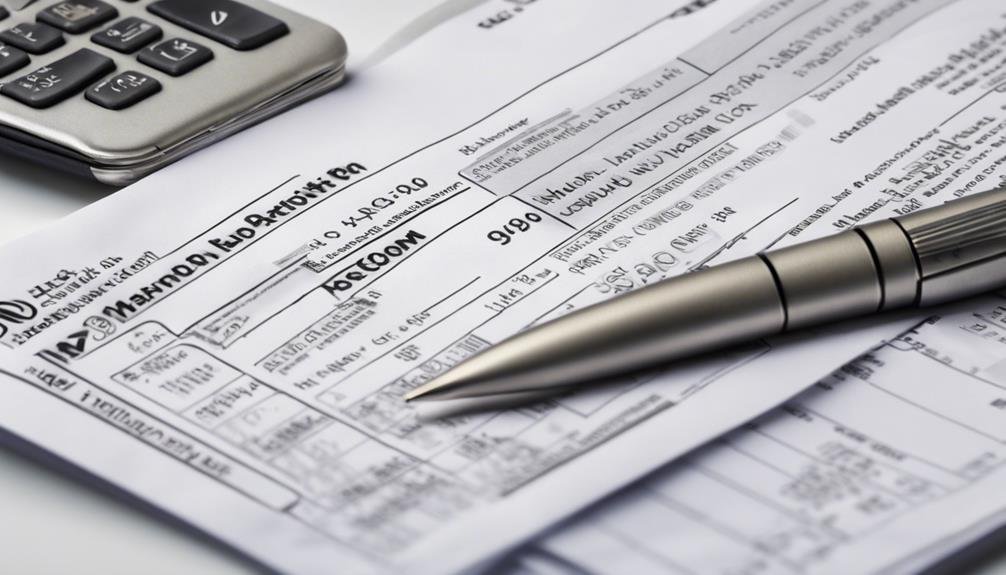When reporting crypto donations on taxes, accurately valuing and documenting them is essential for compliance and tax benefits. You must determine fair market value using exchange rates or donation date values. Proper paperwork like IRS Form 8283 is vital for donations over $500. Appraisal by a qualified expert is needed for donations exceeding $5,000. Detailed records on crypto type, charity, and value are critical for transparency.
Following IRS guidelines and working with tax professionals guarantee compliance and maximum benefits. Ensuring accurate reporting allows you to claim deductions correctly and avoid penalties. Discover more about crypto donation tax implications by exploring further details provided.
Table of Contents
Brief Overview of Unlock Tax Savings: The Ultimate Guide to Reporting Crypto Donations on Tax Return
- Determine accurate fair market value for crypto donations.
- Obtain receipt from charitable organization for documentation.
- Use Form 8283 for donations exceeding $5,000.
- Report on Schedule A of Form 1040 for tax purposes.
- Adhere to IRS regulations for proper tax deduction claims.
Determining Fair Market Value for Donation
To accurately report your crypto donation on taxes, you must determine the fair market value of the donated cryptocurrency at the time of the contribution. This valuation is essential for ensuring compliance with tax regulations. The fair market value of the cryptocurrency donation is typically based on the exchange rate or valuation of the crypto on the date of the donation. By accurately evaluating this value, you can maximize your deductions and avoid potential issues with the IRS.
When reporting crypto donations, it is important to document the fair market value properly to substantiate your charitable contribution deduction. This documentation not only helps you comply with tax laws but also demonstrates the value of your donation to a qualified organization. Valuing your cryptocurrency donation correctly allows you to take full advantage of tax benefits while also showcasing your support for charitable causes. Therefore, understanding how to determine the fair market value of your donated crypto is crucial for accurate tax reporting and maximizing the impact of your donations.
Appraisal Requirement for Large Donations

Proper appraisal is vital for determining the fair market value of cryptocurrency donations exceeding $5,000. When making large donations, the IRS requires a detailed appraisal report to guarantee an accurate valuation. In the case of crypto donations, this involves evaluating the current market value of the digital assets. To meet IRS standards for donations over $5,000, a qualified appraiser must provide a thorough written appraisal report. This valuation process is essential for substantiating large cryptocurrency donations on tax returns.
By obtaining a professional appraisal, you not only comply with IRS regulations but also establish the value of your donation with credibility. Ensuring the fair market value through an appraisal is key to accurately reporting your contributions and avoiding potential discrepancies in the valuation of your crypto assets. Engaging a qualified appraiser to conduct a detailed assessment is a prudent step when dealing with significant cryptocurrency donations.
Reporting on IRS Form 8283

When completing IRS Form 8283 for reporting cryptocurrency donations, you will need to provide detailed information about the donated crypto, such as its type and fair market value. This form also requires you to describe the recipient organization receiving the donation. Remember that attaching Form 8283 to your tax return is essential for donations exceeding $500 to guarantee accurate reporting and deduction claims.
IRS Form 8283 Basics
Reporting on IRS Form 8283 is an important step when documenting non-cash charitable contributions, such as cryptocurrency donations. This form is vital for donors who are donating crypto or other non-cash items exceeding $500 in value. When filling out Form 8283, you must provide details about the donated property, including its fair market value, acquisition date, and how the charity utilized it.
By accurately completing this form, you not only substantiate your charitable deductions but also guarantee compliance with IRS regulations. Properly documenting your crypto donations on IRS Form 8283 is essential for maximizing tax benefits and avoiding any issues with the IRS. Make sure to adhere to the guidelines to accurately report your contributions and claim the appropriate deductions.
Required Information Fields
Confirm that the necessary information fields on IRS Form 8283 are accurately completed when reporting your crypto donations for tax purposes. To guarantee precise reporting, consider the following key details:
- Donor Details: Provide your personal information, including name and address.
- Recipient Organization: Specify the charitable organization receiving the donation.
- Donation Description: Include the date of donation, type of cryptocurrency donated, and its fair market value.
- Detailed Description and Intended Use: Describe the donated property in detail and explain how the charitable organization intends to use it.
Details on Schedule M for Form 990

When reporting cryptocurrency donations on Schedule M for Form 990, you need to provide a detailed overview of the donated property, including the type and date of donation. Additionally, it is essential to accurately determine the fair market value of the cryptocurrency at the time of donation as per IRS guidelines. Ensuring that you meet the reporting requirements and filing deadlines is important for compliance and transparency in documenting these noncash contributions.
Schedule M Overview
Guarantee precise reporting of noncash contributions, including cryptocurrency donations, by completing Schedule M, an attachment to Form 990 that demands detailed information on donated property and recipient organizations.
- Schedule M is vital for accurate reporting of noncash contributions to the IRS.
- It requires detailed information on all types of donated property, including cryptocurrency.
- Donors should review Schedule M to make sure their cryptocurrency donations are accurately reported.
- Proper completion of Schedule M is essential for transparency and compliance with IRS regulations.
Reporting Requirements
To accurately report crypto donations on taxes, make sure that Schedule M for Form 990 is completed with detailed information on noncash contributions, including cryptocurrency donations. This involves providing specifics about the donated cryptocurrency, such as type, quantity, and valuation. Schedule M plays an important role in helping organizations accurately report noncash donations to the IRS.
By guaranteeing the proper completion of Schedule M, nonprofits and charities can maintain transparency and compliance with tax regulations. Failing to include all necessary details about the donated cryptocurrency may lead to reporting inaccuracies and potential issues with tax authorities. Hence, it is essential to meticulously document and report all noncash contributions, including the specifics of any donated cryptocurrency, to ensure full compliance.
Filing Deadlines
Make sure you meet the filing deadline for Form 990, which includes Schedule M detailing crypto donations, by submitting it by the 15th day of the 5th month after your organization’s accounting period. Here are some key points to take into account:
- Missing the deadline can lead to penalties for noncompliance with IRS regulations.
- Schedule M requires accurate reporting of the fair market value of cryptocurrency donations.
- Filing Schedule M is essential for tax-exempt organizations to maintain transparency regarding noncash contributions.
- Ensuring accuracy when reporting crypto donations on Schedule M enhances the overall compliance of your organization with IRS requirements.
Keeping Thorough Donation Records

Maintaining precise donation records is essential for accurately documenting and reporting cryptocurrency donations on your taxes. Your records should include the date of the donation, type of cryptocurrency donated, the name of the receiving charity, and the fair market value at the time of the donation. This information is vital for calculating any potential market gains and ensuring compliance with Substantiation requirements for Noncash Charitable Contributions.
Additionally, keeping records of any acknowledgment or receipt from the charity confirming the donation value will help support your claimed deduction on your crypto tax bill. Proper documentation not only substantiates the charitable contribution deduction but also aids in complying with capital gains taxes associated with donating cryptocurrency.
By consistently maintaining thorough donation records, you can effectively report your contributions, maximize tax benefits, and demonstrate your support for qualified charitable organizations. Remember, accurate record-keeping is key to fulfilling your tax reporting obligations and maximizing the impact of your charitable giving.
Compliance With IRS Regulations

Ensuring compliance with IRS regulations when reporting crypto donations on taxes is essential for avoiding potential scrutiny and maximizing tax benefits. To navigate this process effectively and securely, consider the following essential points:
- Accurate Valuation: Properly valuing the donated cryptocurrency is vital for tax reporting purposes. Use reliable methods to determine the fair market value at the time of the donation.
- Documentation Requirements: Keep detailed records, including receipts and acknowledgments from the charity, to support your crypto donation claims. This documentation is crucial for substantiating your charitable contributions.
- Following IRS Guidelines: Adhere to the specific reporting guidelines set by the IRS for cryptocurrency donations. By following these rules diligently, you can minimize the risk of facing IRS scrutiny.
- Maximizing Tax Benefits: By complying with IRS regulations and accurately reporting your crypto donations, you can maximize your tax benefits while staying in line with tax laws. Proper reporting ensures transparency and accountability in your charitable giving.
Maximizing Tax Benefits

To maximize tax benefits when reporting crypto donations, accurately determining the fair market value of the donated cryptocurrency is vital. You can claim a charitable contribution deduction for the full fair market value of the donated cryptocurrency on your taxes, but to guarantee you receive the maximum benefit, it’s advisable to work with a tax professional. They can assist with accurate reporting and guide you through the process.
If your donation exceeds $5,000, remember to file Form 8283 along with Schedule A to report the cryptocurrency donation properly. Additionally, obtaining a receipt from the charity confirming the value of the donated cryptocurrency is essential. This receipt serves as documentation for the donation and is crucial for maximizing tax benefits. By taking these steps and working with a tax professional, you can ensure that you are making the most of the tax benefits available for your crypto donations.
Importance of Accurate Reporting

Accurately reporting your crypto donations on taxes is key for meeting IRS regulations and maximizing your tax benefits. Here’s why precise reporting is essential:
- Compliance: Following IRS regulations guarantees you stay compliant and avoid potential penalties.
- Proper Documentation: Maintaining detailed records of donation details such as dates, values, and recipients is vital for accurate reporting.
- Determining Fair Market Value: Reporting involves determining the fair market value of donated assets at the time of donation, impacting your tax deductions.
- Maximizing Tax Benefits: Detailed reporting helps you maximize your tax benefits and avoid penalties by ensuring proper deduction claims.
Tax Implications for Crypto Donations

When reporting crypto donations on your taxes, determining the fair market value of the donated cryptocurrency is essential. This value represents the amount the cryptocurrency would sell for on the open market. To do this accurately, you must obtain a receipt from the charitable organization confirming the value at the time of donation. For donations exceeding $5,000, additional forms like Form 8283 are required.
Reporting crypto donations on Schedule A of Form 1040 is necessary for amounts up to $5,000. Proper documentation and accurate reporting are critical not only for maximizing tax benefits but also for complying with IRS regulations. By following these guidelines, you confirm you are correctly reporting your crypto donations, which can lead to potential tax deductions while supporting charitable causes. Understanding the tax implications of crypto donations is essential for maneuvering the intersection of cash, cryptocurrency, and charitable giving within the confines of the law.
Frequently Asked Questions
Is Donating Crypto a Taxable Event?
Donating crypto isn’t a taxable event, providing tax benefits to donors. Record the donation’s value accurately for tax deductions. Confirm the nonprofit meets IRS guidelines for eligibility. Reporting requirements hinge on the legal implications.
Can You Write off Crypto Donations?
You can write off crypto donations as tax-deductible if given to eligible organizations. The IRS allows deductions based on fair market value. Proper documentation, adhering to IRS guidelines, and reporting accurately are crucial for claiming tax benefits on crypto donations.
What Is the Rule for Crypto Tax Reporting?
When it comes to the rule for crypto tax reporting, you must abide by IRS guidelines for reporting requirements. Properly document your cryptocurrency donations, ensuring accurate reporting for tax implications, capital gains, and potential deductions.
How Do I Report Crypto Gifts on My Taxes?
When reporting crypto gifts on taxes, consider tax implications, gift reporting, cryptocurrency value, and IRS guidelines. Your responsibility involves record keeping, capital gains, tax deductions, and using the right tax forms for accurate reporting.
Conclusion
To sum up, precisely reporting crypto donations on taxes involves establishing fair market value, maintaining detailed records, and adhering to IRS regulations. By maximizing tax benefits and comprehending the tax implications of crypto donations, you can guarantee proper documentation and avoid potential issues with the IRS. Remember, thorough reporting is crucial to maintaining compliance and maximizing benefits. Don’t underestimate the significance of accurate reporting for your crypto donations.




